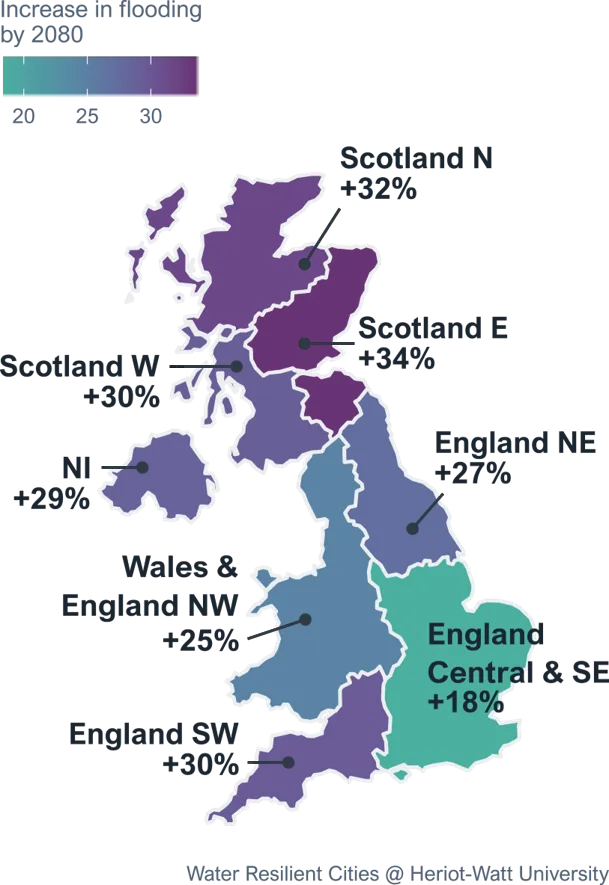Flooding across the UK could increase by an average of 15-35 per cent by the year 2080, a new study has suggested.
Researchers from the Water Resilient Cities project at Heriot-Watt University in Edinburgh looked at flooding activity deemed “one in two-year” and “one in 30-year” events for their projections.
This covers the likelihood of a flood event occurring – for example, a one in two-year return period run-off or flood event has a one in two chance of being equalled or exceeded in any given year.
Parts of Scotland face a 34 per cent increase in flooding in the next 50 years, according to the study, but at the other end of the UK, in south-east England, there is an 18 per cent increase expected.
Read more about climate change:
- 2020 was the second-hottest year on record, Met Office says
- Rewilding: Can it save our wildlife and temper climate change?
“We used multiple datasets and methods and compared the results, using the most up-to-date data available," said Dr Annie Visser-Quinn, a data scientist at Heriot-Watt. “The estimates paint a concerning picture for the future UK flood landscape, especially when combined with increasing urbanisation.
“Across the UK, we found that the magnitude of the one in two-year event could increase by 15-35 per cent. The north and east of Scotland is facing a 34 per cent increase in the magnitude of flood events, which is significant – the north of England and Wales are similarly high at 25-28 per cent.
“London and the Midlands have the lowest percentage increase. The magnitude of their one in two-year events will increase by 18 per cent – even a small increase can have a profound impact on urban areas.”

It comes as communities brace for Storm Christoph, with “significant” rainfall due across large swathes of the UK.Major incidents had been declared in Greater Manchester and South Yorkshire amid amber and yellow weather warnings for the storm with snow also expected northern areas.
When it hit last year, Storm Dennis was considered a “one in 30-year” event, but the scientists are unable to say whether the incidence of this will increase in years to come.
“We couldn’t get the different models to agree on those more unusual, extreme events, so there is still uncertainty there," added Dr Visser-Quinn.“However, we do think the bigger change will occur in the south and south-west of England. That’s concerning given these are the more extreme events.
“Robust modelling will help improve our flood preparedness, which is why this work is essential. New climate data coming out later this year should be investigated as quickly as possible to inform the UK’s flood protection policies.”
Reader Q&A: Do we really know what climate change will do to our planet?
Asked by: Jennifer Cowsill, via email
There is no doubt that greenhouse gas emissions caused by humans are changing our climate, resulting in a progressive rise in global average temperatures. The scientific consensus on this is comparable to the scientific consensus that smoking causes lung cancer.
Our climate is a hugely intricate system of interlinking processes, so forecasting exactly how this temperature increase will play out across the globe is a complex task. Scientists base their predictions on powerful computer models that combine our understanding of climatic processes with past climate data.
Many large-scale trends can now be calculated with a high degree of certainty: for instance, warmer temperatures will cause seawater to expand and glaciers to melt, resulting in higher sea levels and flooding. More localised predictions are often subject to greater uncertainty.
Read more: